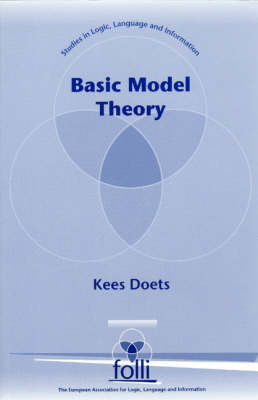
Basic Model Theory
Seiten
1996
Centre for the Study of Language & Information (Verlag)
978-1-57586-048-0 (ISBN)
Centre for the Study of Language & Information (Verlag)
978-1-57586-048-0 (ISBN)
Introduces the reader to what is basic in model theory.
Model theory investigates the relationships between mathematical structures ('models') on the one hand and formal languages (in which statements about these structures can be formulated) on the other. Example structures are: the natural numbers with the usual arithmetical operations, the structures familiar from algebra, ordered sets, etc. The emphasis is on first-order languages, the model theory of which is best known. An example result is Löwenheim's theorem (the oldest in the field): a first-order sentence true of some uncountable structure must hold in some countable structure as well. Second-order languages and several of their fragments are dealt with as well. As the title indicates, this book introduces the reader to what is basic in model theory. A special feature is its use of the Ehrenfeucht game by which the reader is familiarised with the world of models.
Model theory investigates the relationships between mathematical structures ('models') on the one hand and formal languages (in which statements about these structures can be formulated) on the other. Example structures are: the natural numbers with the usual arithmetical operations, the structures familiar from algebra, ordered sets, etc. The emphasis is on first-order languages, the model theory of which is best known. An example result is Löwenheim's theorem (the oldest in the field): a first-order sentence true of some uncountable structure must hold in some countable structure as well. Second-order languages and several of their fragments are dealt with as well. As the title indicates, this book introduces the reader to what is basic in model theory. A special feature is its use of the Ehrenfeucht game by which the reader is familiarised with the world of models.
Introduction; 1. Basic notions; 2. Relations between models; 3. Ehrenfeucht-Fraïssé games; 4. Constructing models; Appendix A. Deduction and completeness; Appendix B. Set theory; Bibliography; Name index; Subject index; Notation.
| Erscheint lt. Verlag | 13.6.1996 |
|---|---|
| Reihe/Serie | Studies in Logic Language and Information |
| Verlagsort | Stanford |
| Sprache | englisch |
| Maße | 152 x 228 mm |
| Gewicht | 210 g |
| Themenwelt | Mathematik / Informatik ► Mathematik ► Angewandte Mathematik |
| Mathematik / Informatik ► Mathematik ► Logik / Mengenlehre | |
| ISBN-10 | 1-57586-048-1 / 1575860481 |
| ISBN-13 | 978-1-57586-048-0 / 9781575860480 |
| Zustand | Neuware |
| Haben Sie eine Frage zum Produkt? |
Mehr entdecken
aus dem Bereich
aus dem Bereich
Buch | Softcover (2024)
Springer Vieweg (Verlag)
CHF 62,95
Anwendungen und Theorie von Funktionen, Distributionen und Tensoren
Buch | Softcover (2023)
De Gruyter Oldenbourg (Verlag)
CHF 97,90


